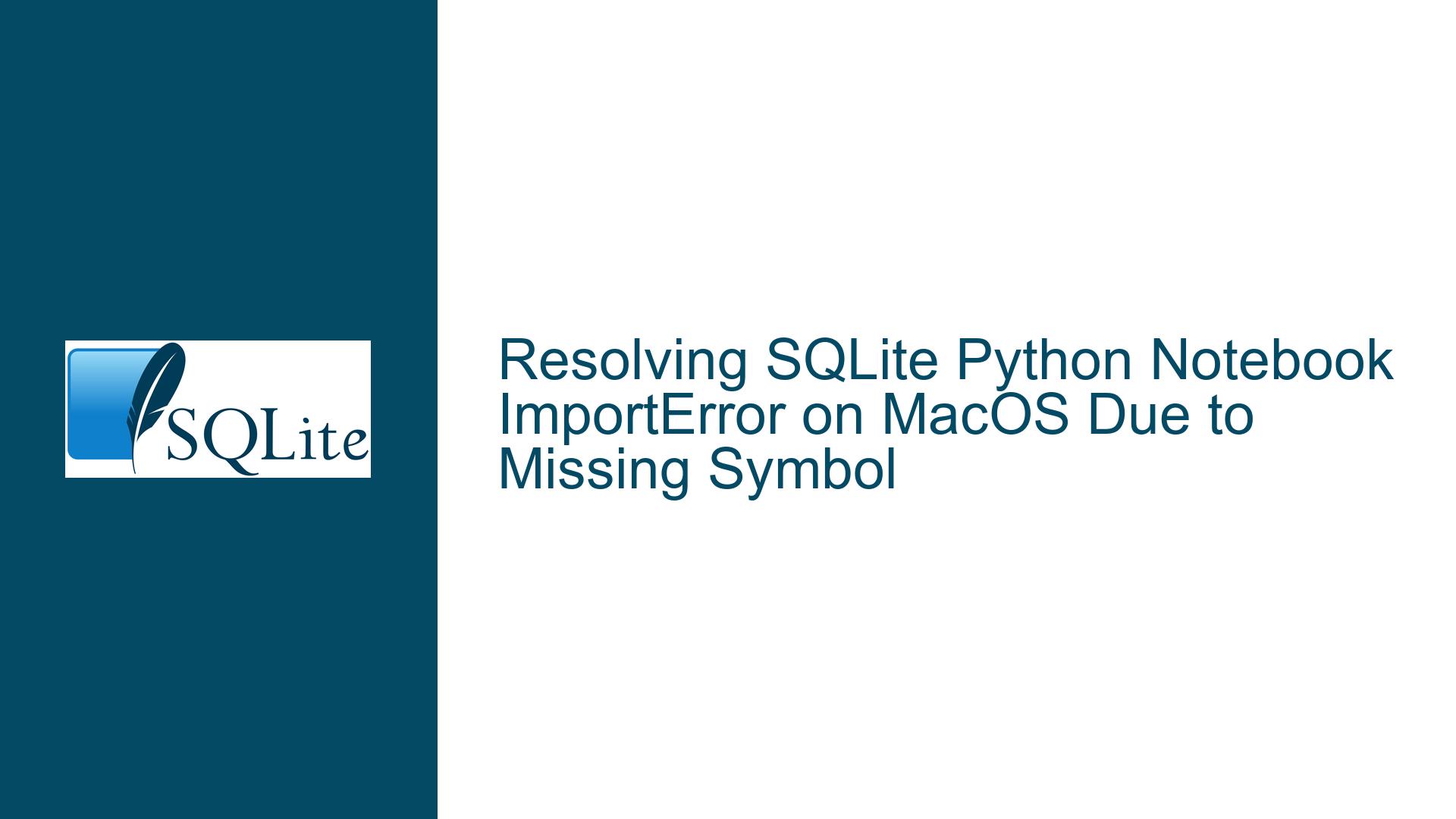Resolving SQLite Python Notebook ImportError on MacOS Due to Missing Symbol
Issue Overview: Python Notebook Fails to Load SQLite Extension on MacOS
The core issue revolves around an ImportError encountered when attempting to use Python notebooks on MacOS with the latest version of libsqlite (3.49.0). The error message indicates that the Python SQLite wrapper (_sqlite3.cpython-310-darwin.so) is unable to locate the _sqlite3_enable_load_extension symbol in the system’s libsqlite3.dylib. This symbol is crucial for enabling SQLite’s extension loading functionality, which is required by the Python SQLite wrapper to operate correctly.
The error manifests when creating a new Conda environment with Python 3.10, installing the necessary Python notebook packages, and attempting to run a notebook cell. The issue does not occur with earlier versions of libsqlite (e.g., 3.48.0), suggesting a compatibility or configuration problem specific to version 3.49.0 or the environment setup.
The error message explicitly states that the _sqlite3_enable_load_extension symbol is missing from the libsqlite3.dylib located in /usr/lib. This library is part of the system-wide installation of SQLite provided by Apple. The absence of this symbol indicates that the system’s SQLite library was compiled without support for loadable extensions, a common configuration choice by Apple for security and stability reasons.
Possible Causes: Mismatched SQLite Compilation Flags and Library Paths
The root cause of the issue lies in the mismatch between the compilation flags used for the Python SQLite wrapper (_sqlite3.cpython-310-darwin.so) and the system’s libsqlite3.dylib. The Python wrapper was compiled with the assumption that the sqlite3_enable_load_extension function would be available in the linked SQLite library. However, the system’s libsqlite3.dylib was compiled without this function, leading to the missing symbol error.
Apple’s system-wide SQLite library, located in /usr/lib, is known to have certain features disabled, including loadable extension support. This is a deliberate choice by Apple to enhance security and reduce the attack surface of the SQLite library. When the Python SQLite wrapper attempts to load the sqlite3_enable_load_extension function, it fails because the function is not present in the system’s SQLite library.
Another contributing factor is the use of Conda for environment management. Conda environments often rely on their own versions of libraries, which can lead to conflicts with system-wide libraries. In this case, the Python SQLite wrapper is attempting to link against the system’s libsqlite3.dylib instead of a local version of SQLite that includes the necessary functions. This mismatch between the expected and available symbols results in the ImportError.
Additionally, the path /usr/lib/libsqlite3.dylib is outdated on recent versions of MacOS. Modern MacOS versions use /usr/lib/libsqlite3.tbd if Xcode is installed. This discrepancy further complicates the issue, as the Python SQLite wrapper may be attempting to link against a non-existent or incorrect library path.
Troubleshooting Steps, Solutions & Fixes: Recompiling and Configuring SQLite for Python Notebooks
To resolve the issue, several steps can be taken to ensure that the Python SQLite wrapper and the SQLite library are compatible and correctly configured. The primary goal is to either recompile the Python SQLite wrapper without relying on the sqlite3_enable_load_extension function or to use a local version of SQLite that includes this function.
Step 1: Verify the System’s SQLite Configuration
The first step is to verify the configuration of the system’s SQLite library. This can be done by checking the compilation flags used for the system’s libsqlite3.dylib. Run the following command in the terminal to check the SQLite version and compilation options:
sqlite3 --version
This command will display the version of SQLite installed on the system. To check the compilation options, use the following SQLite command:
PRAGMA compile_options;
This will list the compilation options used for the SQLite library. Look for the ENABLE_LOAD_EXTENSION option. If this option is not present, it confirms that the system’s SQLite library was compiled without loadable extension support.
Step 2: Install a Local Version of SQLite with Loadable Extension Support
If the system’s SQLite library does not support loadable extensions, the next step is to install a local version of SQLite that includes this feature. This can be done using a package manager like Homebrew, which allows for easy installation of custom-compiled libraries.
To install SQLite with Homebrew, run the following commands:
brew install sqlite3
This will install SQLite with the default compilation options, which typically include loadable extension support. After installation, verify the installation by checking the version and compilation options:
sqlite3 --version
PRAGMA compile_options;
Ensure that the ENABLE_LOAD_EXTENSION option is present in the compilation options.
Step 3: Configure the Python SQLite Wrapper to Use the Local SQLite Library
Once a local version of SQLite with loadable extension support is installed, the next step is to configure the Python SQLite wrapper to link against this version of SQLite. This can be done by setting the appropriate environment variables before installing or recompiling the Python SQLite wrapper.
First, locate the path to the locally installed SQLite library. This can typically be found in /usr/local/opt/sqlite3/lib if installed via Homebrew. Set the LDFLAGS and CPPFLAGS environment variables to include this path:
export LDFLAGS="-L/usr/local/opt/sqlite3/lib"
export CPPFLAGS="-I/usr/local/opt/sqlite3/include"
Next, reinstall the Python SQLite wrapper to ensure it links against the local SQLite library. If using Conda, create a new environment and install the necessary packages:
conda create -n myenv python=3.10
conda activate myenv
pip install notebook ipywidgets
If the issue persists, it may be necessary to recompile the Python SQLite wrapper from source. Download the Python source code and navigate to the Modules directory:
wget https://www.python.org/ftp/python/3.10.0/Python-3.10.0.tgz
tar -xzf Python-3.10.0.tgz
cd Python-3.10.0/Modules
Edit the Setup file to ensure the SQLite wrapper links against the local SQLite library:
_sqlite3 _sqlite/sqlite3.c -I/usr/local/opt/sqlite3/include -L/usr/local/opt/sqlite3/lib -lsqlite3
Recompile the Python SQLite wrapper:
make
After recompilation, reinstall the Python SQLite wrapper:
make install
Step 4: Verify the Fix and Test the Python Notebook
After completing the above steps, verify that the Python SQLite wrapper is correctly linked against the local SQLite library. Open a Python shell and import the sqlite3 module:
import sqlite3
print(sqlite3.sqlite_version)
This should display the version of the local SQLite library. Next, test the loadable extension support by attempting to load an extension:
import sqlite3
conn = sqlite3.connect(':memory:')
conn.enable_load_extension(True)
If no errors occur, the issue has been resolved. Finally, test the Python notebook by opening a new notebook and running a cell. The ImportError should no longer occur, and the notebook should function as expected.
Conclusion
The ImportError encountered when using Python notebooks with the latest version of libsqlite on MacOS is caused by a mismatch between the Python SQLite wrapper and the system’s SQLite library. By verifying the system’s SQLite configuration, installing a local version of SQLite with loadable extension support, and configuring the Python SQLite wrapper to link against this local library, the issue can be resolved. Following these steps ensures that the Python SQLite wrapper and the SQLite library are compatible, allowing Python notebooks to function correctly on MacOS.






